|
De Nederlandse dichter Leo Vroman werd op 10 april 1915 in Gouda geboren. Zie ook alle tags voor Leo Vroman op dit blog.
Ik zal wel zien
Ik zal wel zien
in dat rotgebied
van duisternis
of daar nog iets is
of opzettelijk niet;
ja ik zal misschien
nog even pogen
daarheen te kijken
met glazige ogen
net als andere lijken
of als een groeiende kreeft
uit mijn strak huidskelet
naar buiten breken
om wat mij omgeeft
te verlaten, met
wat ik beteken.
Huis en tuin
Hoe dromerig denk ik de wei
zo'n eerste zomer zonder mij.
Het huis is leeg, de tuin is vol.
De paardenbloemen pluizen bol.
De vogels maken geen geluid.
Het gras groeit boven de rozen uit.
Heel voorzichtig gaan de bomen
liggen om in slaap te komen.
Uit hun rompen rijst een woud.
En het huis wordt niet herbouwd.
MORAAL
Ach wat groeit het leven goed
als het niet van mensen moet.
Lieve Critici
Lieve critici, ik vrees
dat ik geen doel of doelgerichte
lijn in de loop der jaren lees
van mijn duizenden gedichten.
Ik blijf een ventje dat maar schrijft
en nauwelijks wil weten
of zijn bekladdering beklijft
of gretig wordt vergeten.
Eergisteren zei mijn dermatoloog:
Ik zie een kleine zwarte plek en die
vereist even een biopsie.
Melanoma, vroeg ik droog.
Zo ja, dan leef ik nu nog maar
hoogstens een paar jaar.
Zo nee, dan ook een paar.
Van zijnd naar bijna niet meer zijnde
kijk ik met voldoening naar
het einde van mijn einde.
Hoewel, een enkele keer
denk ik toch
Dit nog. Dat nog.
Dit misschien nooit meer.
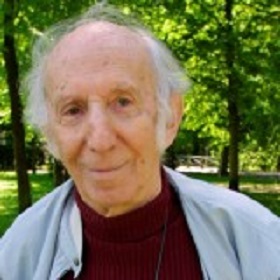
Leo Vroman (10 april 1915 - 22 februari 2014)
De Nederlandse schrijver Jan van Mersbergen werd geboren in Gorinchem 10 april 1971. Zie ook alle tags voor Jan van Mersbergen op dit blog.
Uit:Naar de overkant van de nacht
“Ik hoor hem zeggen: Afscheid nemen kan alleen van iets dat bij je is geweest.
Mijn mond is dood. Koud. Bevroren. Ik probeer te slikken, weet niets te zeggen, kan ook niets zeggen. Ik kan alleen proberen een gezicht op te zetten dat huh of wat of hoezo uitdrukt. Hij zegt het nog een keer.
Afscheid nemen kan alleen van iets dat bij je is geweest.
Ik laat hem praten.
Jij zegt dat je naar huis moet, maar je kunt altijd nog weg. Je hebt thuis afscheid genomen. We hebben allemaal afscheid van ons normale leven genomen. Van wat bij je was. Wat in je hart zit. Dat is moeilijk.
In mijn hoofd tikt het. De Pater gaat door.
Alles wat geweest is is geweest. Alles wat komen gaat gaat komen. Alles wat daar tussenin ligt is nu.
Het is onzeker en leeg, maar dat is afscheid. Dat is de Vastelaovend. Voel de Vastelaovend, een paar dagen lang. Tijdens die dagen bestaat alleen het nu, onder één voorwaarde.
Hij is even stil, weer die glimlach. Hij tikt tegen de scheurkalender onder zijn patersjas. Zijn stem is helder.
Je kunt geen afscheid nemen van iets wat je niet in je handen hebt gehad.
Ik probeer weer iets te zeggen, maar prazel-hazel-wazel wat beejein. Ik begrijp dat hij wil zeggen: Dans, drink en geniet, en laat het daarna gaan.
Pak het vast, straks is het er niet meer.
De Joekskapel blaast dae mekkelikke losse dans. Ook die herken ik, die schalde uit de draagbare cd-speler van mijn oom. De kou trekt naar mijn tenen. Achter mijn rug langs lopen een Beer en een Cowboy en een man in harnas met vier bekers bier onder zijn arm.
Dan wijs ik de Pater mijn veermanspet en mijn veermansjasje. Op de letters op de klep.”
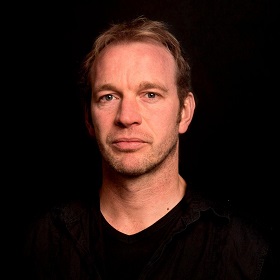
Jan van Mersbergen (Gorinchem, 10 april 1971)
De Amerikaanse schrijver Paul Edward Theroux werd geboren op 10 april 1941 in Medford, Massachusetts. Zie ook alle tags voor Paul Theroux op dit blog.
Uit: Riding the Iron Rooster
“The terra-cotta warriors (which cannot be photographed) were not a disappointment to me. They are too bizarre for that. They are stiff, upright, life-sized men and horses, marching forward in their armor through an area as big as a football field — hundreds of them, and each one has his own face and his own hairstyle. It is said that each clay figure had a counterpoint in the emperor’s real army, which was scattered throughout the Qin empire. Another theory is that the individual portraiture was meant to emphasize the unity of China by exhibiting “all the physical features of the inhabitants of mainland east Asia”. Whatever the reason, each head is unique, and a name is stamped on the back of every neck — perhaps the name of the solider, perhaps that of the potter-sculptor.
It is this lifelike quality of the figures — and the enormous number of them — that makes the place wonderful, and even a little disturbing. As you watch, the figures seem to move forward. It is very hard to suggest the human form in armor, and yet even with these padded leggings and boots and heavy sleeves, the figures look agile and lithe, and the kneeling archers and crossbowmen look alert and fully human.
This buried army was very much a private thrill for the tyrant who decreed that it be created to guard his tomb. But the first emperor, Qin Shi Huangdi, was given to grand gestures. Until his time, China was fragmented into the Warring States, and bits of the Wall had been put up. As Prince Cheng, he took over from his father in 246 B.C. He was thirteen years old. Before he was forty he had subdued the whole of China. He called himself emperor. He introduced an entirely new set of standards, put one of his generals — and many of his convicts and peasants — to work building the Great Wall, abolished serfs (meaning that, for the first time, the Chinese could give themselves surnames), and burned every book that did not directly praise his achievements — it was his way of making sure that history began with him. His grandiose schemes alienated his subjects and emptied his treasury. Three attempts were made to kill him. Eventually he died on a journey to east China, and to disguist his death, his ministers covered his stinking corpse with rotten fish and carted him back to be buried here. The second emperor was murdered, and so was his successor, in what the Chinese call “the first peasant insurrection in Chinese history”.

Paul Theroux (Medford, 10 april 1941)
De Italiaanse schrijver en vertaler Claudio Magris werd geboren op 10 april 1939 in Triëst. Zie ook alle tags voor Claudio Magris op dit blog.
Uit:Blindly (Vertaald door Anne Milano Appel)
“But at least there, in that cell, as I wrote those bogus questions inside those grimy walls, it was I who formulated them, even though it was the Reverend who later trumpeted them from the pulpit, whereas elsewhere, everywhere, before and after, for years and years in saecula saeculorum, it was others who shouted them in my ears instead: "So then, that mayhem in Iceland was caused by you and you alone, just like that, for the sake of those godforsaken devils with their rickets and ringworm, no one helped you turn His Majesty's seas into a shambles, did they, so you fessed up without thinking that you were lined up there with others to listen to the speech of the new prison commander," down comes the cat-o'nine-tails, "so you don't recognize the face of that Communist, you never saw him before, and those flyers appeared in your pocket by some miracle," here come the kicks and blows, "so then you're not a spy, not a traitor intent on sabotage, pretending to be a comrade, the free socialist Yugoslavia of the workers, maybe you're an Italian Fascist pig who wants to recover Istria and Fiume," down goes your head in the shithole or scurry as fast as you can between the rows of convicts, forced to beat you as hard as they can, shouting "Tito Partija! Tito and the Party!" as you run by—but where are those shouts coming from, what an uproar, I can't hear a thing anymore, whose ear is this, deafened, stunned, out of order, it must have been a wallop and if someone packed it, someone certainly caught it, me or somebody else.
There, it's over, the roaring is subsiding. That too was a rhetorical question; it's my ear, this one here, seeing that you, Dr. Ulcigrai, are bending over the other one, the left one, when you ask me "So then, your real name is supposedly Jorgen and you say you wrote this," showing me that old tattered book that I found in that bookshop on Salamanca Place in Hobart Town. At least you don't raise your hand to me, on the contrary, you're very kind, you don't take offence even when I call you Cogoi, and you don't keep on asking me the same questions over and over again. If I don't answer, you let it go, but the fact remains that you asked me and it's pointless because you already know the truth, or think you know it, which is one and the same, and in any case you already know my answer, when I answer you—otherwise you suggest it to me, you put the words in my mouth.”
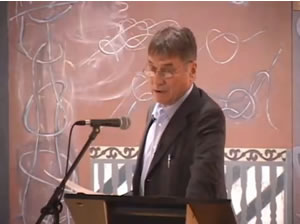
Claudio Magris (Triëst, 10 april 1939)
De Russische dichteres Bella Akhmadulina werd geboren op 10 April 1937 in Moskou. Zie ook alle tags voor Bella Akhmadulina op dit blog.
I'm Clinging To the Old Style
I’m clinging to the noble style,
I’m charmed by speech of our ancestors,
It can be sharper then we try,
And newer than our newest lectures.
To cry: “My kingdom for a horse!” –
Oh, what a largesse and hot-temper!
Then condescend to me, the lost
Futility of final fervour.
I’ll wake up in the darkness ones,
After I’d lost, for good, my battle,
And my reminiscence will thrust
Into resolve, that madman settled.
But I don’t care of kingdoms’ costs!
A child, bred by the ages’ lessons,
I’ll take a horse and give a horse
Just for a moment with a person,
I am in love with. Let you flee,
My horse, so ardent and attractive,
I will untie your rein for free
And you will overtake your native
Herd, which in distance now rustles, –
Midst prairies, empty, wide and reddish.
But I am bored by the bustles
Of many won or lost a skirmish.
I’m sorry for my horse and love!
And in the style of Middle Ages,
My lone steps are lead above.
Vertaald door Yevgeny Bonver
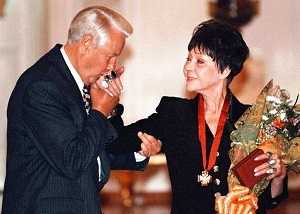
Bella Akhmadulina (Moskou, 10 April 1937)
Hier met president Boris Jeltsin in 1997
De Duitse schrijver Stefan Heym (eig. Hellmuth Flieg) werd geboren op 10 april 1913 in Chemnitz. Zie ook alle tags voor Stefan Heym op dit blog.
Uit: Gesammelte Erzählungen (Zwei Diktatoren)
„Bei Puteoli ist die Sonne mild. Die Pinien verbreiten Schatten und die Quellen Kühle. In einem Garten sitzt ein Mann, dessen Alter schwer zu erraten ist. Er kann dreißig sein oder auch fünfzig oder fünfundfünfzig. Er hat kalte graue Augen, und sein Körper ist von beinahe zierlichem Ebenmaß. Auf seinem Knie liegt ein Wachstäfelchen, die rechte Hand spielt mit dem Schreibgriffel.
Das ist Sulla, der Diktator in Pension, der einzige Herrscher der Weltgeschichte, der es fertigbrachte aufzuhören, als es am schönsten war.
Sulla starrt irgendwo ein Loch in die Luft. Am schönsten, ja. Kein Gegner war mehr da - die Parteien hatte er geknebelt, die Legionen gehörten ihm, Marius war gestorben am vierzehnten Tag seines siebenten Consulats, das sich der Bauer - wie Sulla ihn insgeheim nennt - erobert hat gleich einem Dieb, als er, Sulla, in Asien ein paar Königen Vernunft beibrachte, Vernunft und römische Polizei.
Puteoli ist schöner, Puteoli und das Schreiben. Was ist ein Soldat, was ist ein Politiker für die Ewigkeit? Aber ein Schriftsteller - das ist etwas Besseres. Bücher wird man lesen in hundert Jahren und, vielleicht, auch in tausend - Schlachten sind so schnell vergessen, nutzlos sind sie im Grunde...
Der Bauer mochte an den Ruhm der Schlachten glauben, der war primitiv, der kostete alles bis zu Ende, was er tat. Aber er, Sulla? Er ist zu intellektuell, zu sehr Gehirn - Marius war vielleicht glücklicher. Obwohl sich Sulla nichts mehr gewünscht hätte als einen Augenblick reinen Glücks. Sulla hatte als »Felix« triumphiert, als Glücklicher, nie war ihm eine Schlacht verloren gegangen, alles fiel ihm nur so zu, wenn er es vorher mit seinem scharfen Geist zerlegt hatte - aber er war deshalb noch nicht glücklich. Er sah die kriechenden Larven seiner Anhänger, er roch den unsagbar ekelhaften Geruch des Pöbels, der seinen Wagen schreiend umlagerte - war das Glück?
Je mehr er über sich nachdenkt, desto unklarer wird er sich. In seinen Memoirenbänden, an deren zweiundzwanzigstem er arbeitet, denkt er nur über sich nach und ist am Ende doch so klug wie am Anfang. War das alles Lüge, das ganze Leben, Lüge und zwecklos? Die Suche nach dem Glück, das sich dauernd ihm schenkte? Hatte er sich darum möglicherweise zu betäuben gesucht in dauerndem Kampfe? Im Kampfe mit Marius?”
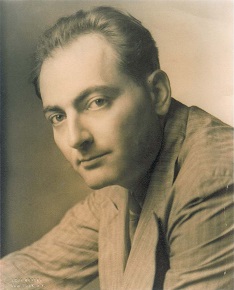
Stefan Heym (10 april 1913 – 16 december 2001)
In 1935
De Vlaamse dichter en beeldhouwer Marcel van Maele werd geboren in Brugge op 10 april 1931. Zie ook alle tags voor Marcel van Maele op dit blog.
Bevlogen en bevangen
Voor Guido Gezelle
Het woord aanroepen en de zinnen belagen,
het woord dat bindt, het woord dat breekt,
dat tiert en giert en verder viert,
dat kruipt en sluipt en zich verderstrekt
of dichtgeklapt wat bekken trekt.
Ik luister naar uw gedicht
dat mij soms wankelen doet en schrijf
het mijne met mijn ogen dicht.
Ik huiver als ik op uw schaduw trap
als gij mij met uw god belast en
in al wat zoet is zijn gebaar herkent.
Gij schrijft me neer en meer en smeert me
keer op keer dat godsbestaan weer aan.
De stem die zich verheft en stilte gebiedt
als het woord de taal verlaat en zwerven gaat.
Aanhoor nu dat zwijgen langs alle kanten,
de wind die liggen gaat,
gekust de bloem en uitgelezen
de lamme die de trommel slaat.
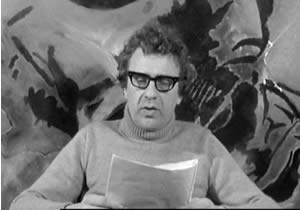
Marcel van Maele (10 april 1931 - 24 juli 2009)
In 1972
Zie voor nog meer schrijvers van de 10e april ook mijn blog van 10 april 2014 en ook mijn blog van 10 april 2012 deel 2.
|



